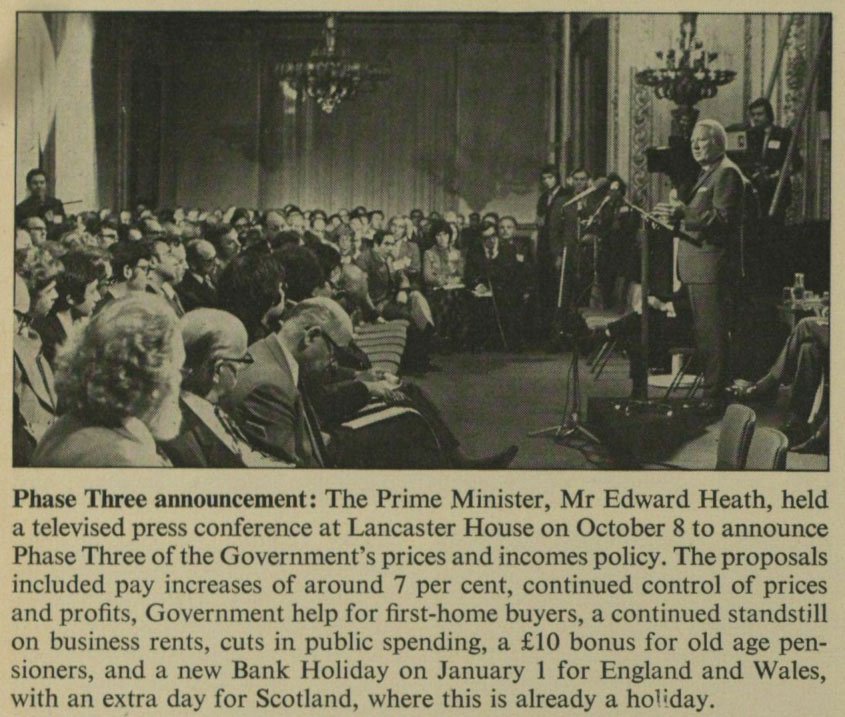The Curious 50-Year History of New Year’s Day as a Bank Holiday
As we recover from 2024’s celebrations, it may surprise some to learn that the New Year’s Day bank holiday is a relatively recent institution at just 50 years old.
The origins of a New Year’s Day holiday are somewhat murky. One theory points to high employee absenteeism after raucous New Year festivities. Declaring a holiday could curb lost productivity.
This was highlighted in a letter to the Times in January 1968. The post concerned the issue of absenteeism on January 1st and proposed moving a Spring holiday to January 1st to address the problem. This discussion led to the Employment (Holiday Extension and Early Retirement) Bill proposal in December 1971 by Denis Howell MP. However, this private member’s bill failed to gain approval.
It took until October 1973 for the government to finally proclaim January 1st an official bank holiday by royal decree.
The first official New Year’s Day holiday was on 1st January 1974 in England.
Coincidentally, the three-day work week was also introduced in early 1974 amid energy shortages. Gifting a day off conserved fuel during the coal miners’ strike. This may well have been the push that brought about the proclamation of a New Year’s Day bank holiday. If true, it’s an odd legacy of that industrial action that we still enjoy a January 1st holiday.
Overall, bank holidays are themselves fairly modern, dating back only to 1871 legislation. So New Year’s Day joining the roster in 1973 came after over a century of January 1st being a regular work day.
Reactions were mixed back in 1974. Some lamented cultural venues closing for the new holiday. But others surely appreciated the official nod to New Year’s rowdiness requiring a day’s recovery.

While the New Year’s Day holiday has now become a firmly established fixture on the calendar, an intriguing legal idiosyncrasy persists. Despite its decades-long tradition, this holiday technically demands annual renewal—a peculiar legal quirk. Hence, this 50-year tradition is, by technicality, still classified as a temporary measure, reminiscent of the annual renewal requirement for income tax and other such Royal Proclamations.
Scotland
This applied to England Wales and Northern Ireland. As for Scotland, According to the 1871 Act, New Year’s Day had already been designated as a Scottish bank holiday. Hogmanay, the Scots term for the last day of the old year, is intricately tied to the Scottish New Year celebration. This celebration typically extends into the morning of New Year’s Day (January 1) and, in certain instances, continues on January 2—a Scottish bank holiday.

In broader contexts, the term Hogmanay is sometimes used more expansively to encompass the entire period spanning the last days of the old year and the initial days of the new year. Notably, not all events falling under the umbrella of Edinburgh’s Hogmanay occur exclusively on December 31.
The origins of Hogmanay are unclear, but it may be derived from Norse and Gaelic observances of the winter solstice.
Half a century on, the January 1st bank holiday is now firmly ingrained in the national calendar. The custom of first-footing with symbolic coal continues, as we collectively ease into the new year.
So next year, as you nurse a post-celebration hangover, amidst the aspirin and coffee, raise a toast to the holiday’s quirky history. And be grateful for those miner’s strikes and dusty parliamentary acts that enshrined the day off work!
Support Independent Journalism Today
Our unwavering dedication is to provide you with unbiased news, diverse perspectives, and insightful opinions. We're on a mission to ensure that those in positions of power are held accountable for their actions, but we can't do it alone. Labour Heartlands is primarily funded by me, Paul Knaggs, and by the generous contributions of readers like you. Your donations keep us going and help us uphold the principles of independent journalism. Join us in our quest for truth, transparency, and accountability – donate today and be a part of our mission!
Like everyone else, we're facing challenges, and we need your help to stay online and continue providing crucial journalism. Every contribution, no matter how small, goes a long way in helping us thrive. By becoming one of our donors, you become a vital part of our mission to uncover the truth and uphold the values of democracy.
While we maintain our independence from political affiliations, we stand united against corruption, injustice, and the erosion of free speech, truth, and democracy. We believe in the power of accurate information in a democracy, and we consider facts non-negotiable.
Your support, no matter the amount, can make a significant impact. Together, we can make a difference and continue our journey toward a more informed and just society.
Thank you for supporting Labour Heartlands









